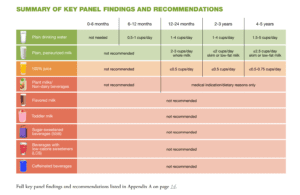
Healthy eating patterns in early childhood (ages 0-5) are crucial to growth, development and chronic disease prevention. Healthy beverage consumption in early childhood is especially important as children rely on beverages for significant calories and nutrients while solid food intake is developing. This is the rationale for expert agreement that young children should consume cow’s milk for their nutritional needs and not plant-based milk.
Recognizing the importance of creating healthy beverage habits early in life, the Robert Wood Johnson Foundation organized an expert panel from four key national health and wellness organizations to develop comprehensive beverage recommendations for early childhood. The organizations represented are the American Academy of Pediatrics (AAP), Academy of Nutrition and Dietetics (AND), American Heart Association (AHA) and the American Academy of Pediatric Dentistry (AAPD). A consensus recommendation “Healthy Beverage Consumption in Early Childhood” was released in September 2019.

The report recommends cow’s milk and water for children ages 1-5, noting “Children between 12 and 24 months can be introduced to plain, pasteurized whole milk, which is full of nutrients such as protein, calcium and vitamin D that growing bodies need.” The recommendations recognize the dairy food group as an “important component of most young children’s diets” due to its 13 essential nutrients that help improve children’s overall health and diet.
While cow’s milk and water are recommended, the report notes that children should avoid plant-based/non-dairy milks (e.g., almond, rice, oat), toddler milks, low-calorie sweetened drinks, sugar-sweetened drinks, caffeine drinks, and flavored milks. The report explains that plant-based milks are “not nutritionally equivalent to cow’s milk” with the exception of fortified soy milk and should only be consumed when medically indicated or to meet dietary preferences (e.g., vegan). The report also states that, “although plant milks may be fortified to attain similar nutrient levels as cow’s milk, it is not known whether the bioavailability of these added nutrients is comparable to that of their naturally-occurring counterparts in cow’s milk.” Plant-based milks are also more expensive than cow’s milk.
For children with lactose intolerance, there are options such as lactose-free or -reduced milk to ensure that they receive the 13 essential nutrients that milk provides.

Milk, whether white or flavored, contains the same 13 essential nutrients and is a delicious way to help people consume essential vitamins and nutrients important for health. While flavored milk is not recommended in early childhood, as children enter the school setting, their options expand, and flavored milk enables school nutrition programs to address the nutrient, taste, and health needs of the students they serve.

Read the full consensus recommendation here.
To learn more about the role of cow’s milk in a healthy diet, visit our Dairy and Your Health page.



